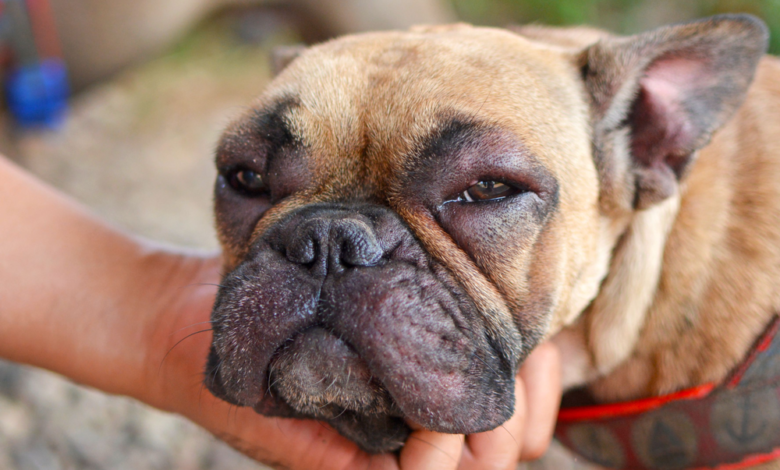
Facial Swelling in Dogs: Causes & Treatments
Face swelling in dogs is frequently a sign of an underlying health problem. Today, our Memphis veterinarians examine the dangerous illnesses that can cause facial swelling in dogs.
Causes of Facial Swelling in Dogs
There are several things that could cause a dog’s face to swell up. They can be small and easy to fix with a trip to the vet, or they can be more serious, like tumors. A dog with a swollen face often has a health problem that’s causing it, so it’s common for this sign to be accompanied by others, like loss of appetite and tiredness. Here are some of the most common things that can make a dog’s face swell up.
Allergic Reaction
Most of the time, a dog’s face will swell up because of an allergic reaction. Some of the many things that could make a dog allergic are bee stings, medicines, certain foods, vaccinations, exposure to toxins, pollen, and bug bites. Mild reactions usually go away on their own with little help, but severe reactions are a veterinary emergency and need help right away.
Allergies cause inflammation, which can make a dog’s face get hives and swell up. The swelling might be most noticeable around the eyes and nose. If your dog is having an allergic reaction, it may also have reddened skin or act in a way that shows they are itchy and uncomfortable.
Dental Problems & Facial Swelling in Dogs
Dogs’ faces can also swell up because of problems with their teeth. Tooth abscesses are dental infections that can happen deep under the gums and cause a pus-filled pocket and facial swelling. When a dog’s face swells up, it could be because of an oral injury, broken teeth, or periodontal disease.
Traumatic Injury
Trauma can make dogs swell up just like it can make people swell up. A swollen face in your dog could be caused by anything from a fall to a bite from another animal. A facial injury is just as likely as any other cause.
Read More: Braces to Fix Your Dog’s Teeth
Tumors
On a dog’s face or head, benign and cancerous tumors can cause facial swelling as they grow. Tumors may be a sign of cancer and can be painful. If you think your dog might have a tumor on its face, you should call your vet as soon as you can. On your pet’s face, cysts can grow and look like swelling, just like tumors. Cysts are fluid-filled growths that don’t hurt most of the time and only need to be looked at if they get big enough.
Preventing Your Dog’s Face from Swelling
If you know your dog has allergies, try to keep them away from allergens that could make them sick. Your vet might also tell you to take antihistamines so you don’t get swollen.
If your dog’s face swelled up after getting a shot, your vet should know why. Your dog can be treated ahead of time to make him less reactive.
You can treat your dog’s reaction to a bee sting, bug bite, or environmental allergy with an antihistamine. Ask your vet about the dosage and type of antihistamine to give your dog.
Keeping up with your dog’s teeth at home and at the vet’s office will prevent most dental problems. Start and maintain a home oral care routine for your dog to reduce dental issues.
Even though trauma can’t always be stopped, it’s always a good idea to remember safety tips. Don’t let your dog run around without a leash or without a fence around it. Keep a close eye on how your pet acts around other animals so you can stop fights from happening. If your dog gets hurt in any way, take him or her to the vet right away.








2 Comments